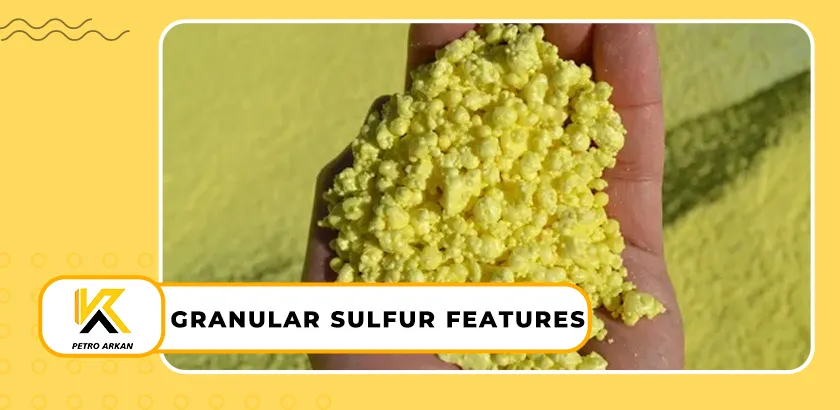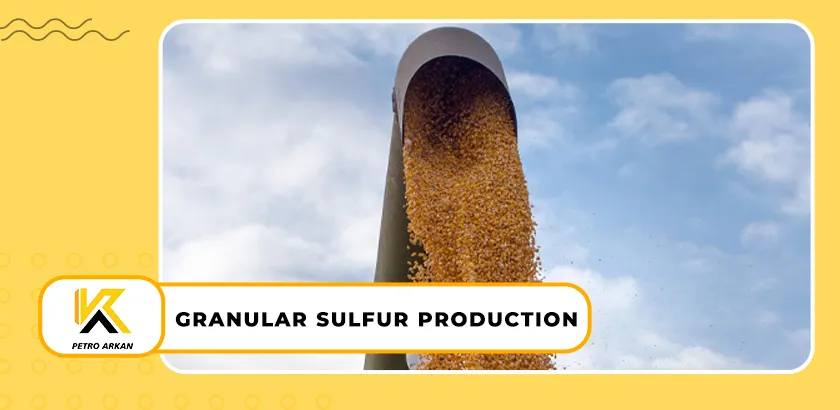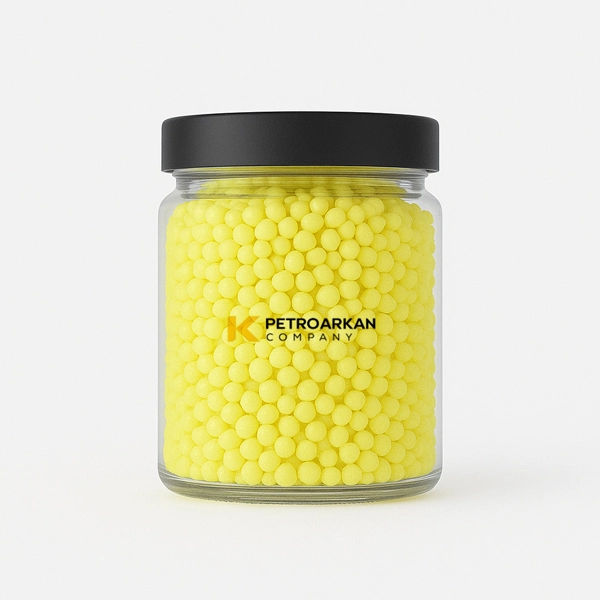Granular sulfur is the best solution for enhancing soil quality and plant growth. Sourced from natural deposits or refineries, these small, yellow granules help lower soil pH and enhance nutrient uptake.
At Petroarkan company, one of the most trustworthy granular sulphur manufacturers, we provide high-quality sulfur products that directly address soil needs, helping you achieve healthier crops and better yields.
Granular Sulfur Features
Granulated sulfur is the raw material form of sulfur and is mainly produced in two ways. It exists in pure form naturally and is sold as a lump or granular sulphur. Sulfur has its uses widely in many industries like agriculture, the production of rubber, manufacturing of paper, and chemicals because it is so adaptable.
The granules are small, yellow particles that readily disperse on the soil. They have a typical sulfuric odour and they crumble very easily due to their soft texture. Lastly, Sulfur doesn’t dissolve in water, but it can dissolve in certain organic solvents, like carbon disulfide.

Granular Sulfur benefits
Sulfur might not always get the spotlight, but it’s a powerhouse when it comes to improving soil and boosting crop health.
Soil Quality Improvement
Granulated sulfur is a breakthrough in soil health. It lowers the pH of alkaline soils, and this makes it easy for the plants to absorb nutrients. It improves the structure of soil by improving permeability, hence providing a favorable environment for beneficial microorganisms, making the soil fertile.
Improving Crop Health
Through the improvement of soil quality, granular sulfur facilitates the absorption of necessary nutrients like iron, zinc, and manganese by the plants. Further, it has antifungal and antibacterial properties, making the plants more disease-resistant. Also, sulfur enhances crop quality, including taste, color, and yield.
Eco-Friendly and Natural
As granulated sulphur is a natural compound, it is eco-friendly and free from toxicity to the environment. It enhances the strength of plants against stresses like drought, salinity, and cold, resulting in healthier and sustainable yields.
Granular Sulfur Production
Granular sulphur is produced in a series of precise steps designed to transform liquid sulfur into small, consistent granules.
The process begins by heating sulfur in special boilers until it melts. The molten sulfur, which can be supplied from refineries or natural deposits, is then pumped into a granulation machine.
In the next phase, liquid sulfur is atomized and introduced into a spinning drum that rotates at a precise speed. When the sulfur is exposed to the cold surface of the drum and water or air, it quickly cools down and solidifies in the granular form.
By controlling the size of granules through different parameters such as the drum’s rotation speed, molten sulfur temperature, and amount of water or air utilized, the producers control the granule size.
After being created, the granules are washed out of any remaining impurities and moved into a drying area. After they dry, the granules are cooled and coated with a protective material so that they do not clump together. The cooled granules are then bagged or barrelled and ready to be distributed.

Granular Sulfur Uses
Granular elemental sulfur is a powerful tool in everything from crop production to industrial manufacturing. Here’s a look at how this often-overlooked element is making a big impact across different sectors.
Agriculture
Granular sulfur fertilizer in agriculture is used widely to lower the pH of alkaline soils so that the necessary nutrients can be made more readily available for uptake by plants. It also serves as a natural fungicide and treats certain fungal diseases. Sulfur can also make crops sweeter, better in color, and bigger.
Chemical Industry
Granular sulfur is very important in the chemical industry, especially in the production process of sulfuric acid – the most important acid in industrial use. It produces fertilizers, dyes, and batteries just to mention a few items in its field of application.
Indeed, sulfur is used in the manufacture of fertilizers in the form of ammonium sulfate or potassium sulfate to provide the required quantities of sulphur for the operation of a plant and guarantee fertile soil.
Rubber Industry
In the rubber industry, sulphur is an important vulcanization agent. By mixing raw rubber with sulphur at high temperatures, sulphur creates cross-links between the polymer chains, which transforms the rubber into a tough, flexible, from a soft, sticky, material.
Paper Industry
Granular sulfur doesn’t have a direct role in papermaking, but it’s vital in producing sulfuric acid, which is an important element in the paper production process.
Sulfuric acid aids in the elimination of lignin from wood pulp and bleaches paper to make it appear brighter and whiter. It is also utilized in the manufacture of aluminum sulfate, or alum, which is introduced into paper to render it resistant to water and ink.
Pharmaceutical Industry
The compound of sulfur is utilized in the pharmaceutical sector, most prominently in the manufacture of antibiotics, such as sulfonamides.
Occasionally, these sulfur compounds can be added to drugs to enhance them by their physical or chemical characteristics. Certain of these sulfur compounds possess antioxidant properties and are added to dietary supplements and other food supplements.
Granular Sulfur Price
Granular sulphur price is shaped by several key factors that influence both its production and distribution.
Below are the factors that influence the granular sulphur’s price:
- Cost of Raw Materials
- Manufacturer Reputation
- Production Equipment
- Labor Costs
- Packaging and Shipping
Petroarkan company, Where Quality Soil Meets Thriving Crops!
At Petroarkan company, we’re changing the way you think about sulfur fertilizer. With Petroarkan company’s sulfur fertilizers, you’re getting a precise, no-nonsense solution to boost soil health and enhance nutrient absorption. If you want to see real, lasting results in your fields, trust the experts who know what your soil needs.
Conclusion
Granular sulfur has a significant part to play in improving the fertility of soils and feeding plants. By minimizing pH levels and maximizing the mobility of nutrients, it creates conditions that are optimum for plants to thrive. Understanding its impact and proper utilization is the route to cleaner ground and healthier yields.
FAQ
- Is granular sulphur environmentally safe?
Yes, granular sulphur is a natural and eco-friendly material that is non-toxic to the environment and promotes sustainable farming.
- What are the major uses of granular sulphur?
Granular sulphur is used in agriculture to adjust soil pH, in the chemical industry for the production of sulfuric acid, and in the rubber, paper, and pharmaceutical industries.
- Is granular sulphur soluble in water?
No, granular sulphur is not soluble in water.




Reviews
There are no reviews yet.